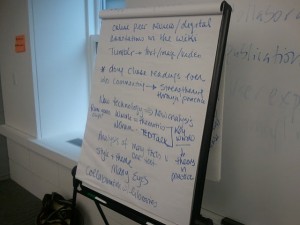Janine Utell had proposed this session, but she was unable to attend so I served as moderator in her place.
Faculty need to publish in peer reviewed journals for tenure
This is weird to say because it implies that open access journals are not peer reviewed. This is propaganda coming from somewhere and I am troubled every time I hear it.
- Copyright hurdles on campus
Do you have a data management plan?
Differences between teaching schools and research schools
Haystack is helpful source for DH stuff
Funding opportunities can be opened up via the digital humanities and open access
The R1/University experience generally feels like a different universe from the one I live in that I want nothing to do with.
The idea of paying $1,000 to make an article open access is one of the most offensive ideas I have ever encountered.
What about class issues and working with various populations if there is a need for cash to access information?
That is elitist universities and publishers declaring war on the lower classes access to information.







